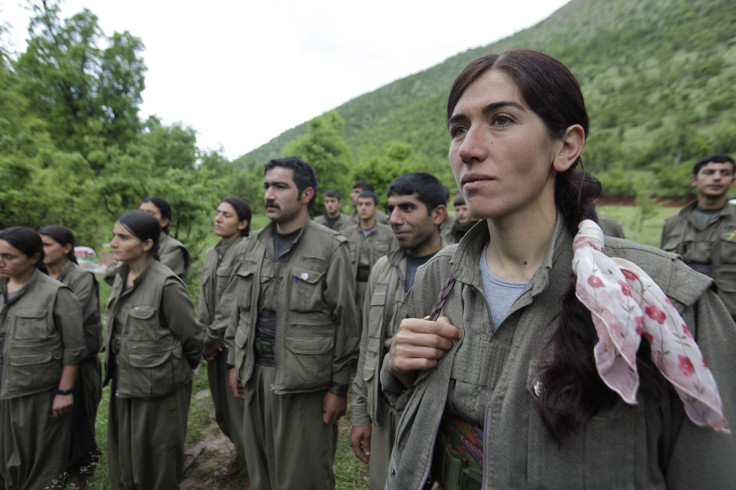US Met With Terrorist-Affiliated Syrian Kurds Fighting ISIS In Kobani

United States officials met with leaders of a Syrian Kurdish political party in Paris last weekend, even though the party is affiliated with the Turkey-based Kurdistan Workers’ Party (PKK), which is deemed a terror group by both the U.S. and Turkey. The Syrian party’s military wing is currently fighting off ISIS in the Syrian city of Kobani on the Turkish border and has repeatedly called for international reinforcements.
The meeting “does not represent coordination -- it represents one conversation,” State Department spokesperson Jen Psaki said Thursday. The U.S.-led coalition has hit Kobani with more than 100 airstrikes in the past two weeks and even coordinated with Kurdish fighters, but this is the first in-person meeting between U.S. and Syrian-Kurdish officials.
The Kurdish Democratic Union party (PYD) is considered the Syrian affiliate of the PKK. Both groups have long-sought to create an independent Kurdish nation that would span parts of Turkey, Iran, Syria and Iraq.
The U.S. declared the PKK a terrorist group in 1997 after they carried out repeated attacks on Turkish government and military positions. Turkey signed a cease-fire with the PKK last year, but the shaky truce didn't survive after ISIS -- the militant group formerly known as the Islamic State of Iraq and Syria -- besieged the PKK’s Syrian affiliates in Kobani.
In the fight against ISIS, Turkey has agreed to allow Syrian opposition forces to be trained within its borders, but has yet to intervene in the battle raging just miles from its border with Syria in Kobani. Earlier this summer, the PKK repeatedly called on the Turkish government to intervene on the side of their Kurdish affiliates. When the Turkish government failed to do so, the PKK accused Turkey of helping ISIS militants “arms and logistics,” and accused it of “partnering ISIL in the attack on Kobani."
Turkey did launch airstrikes Tuesday, but they targeted PKK positions in southern Turkey after weeks of unrest and protests in largely Kurdish areas of the country.
Since the U.S. began bombing ISIS strongholds last month, Turkey has been elusive regarding the nature of its role in the coalition. Turkey wants to make sure the coalition will try to oust Syrian President Bashar Assad in addition to eradicating the insurgents.
“Turkey is against both ISIS and Assad,” Turkish Prime Minister Ahmet Davutoglu said Tuesday.
U.S. officials have urged the Turkish government to increase its role in fighting ISIS but the weekend’s meeting could hinder those negotiations as Turkish President Recep Tayyip Erdogan considers the PKK just as big a threat to Turkey as ISIS.
© Copyright IBTimes 2025. All rights reserved.






















